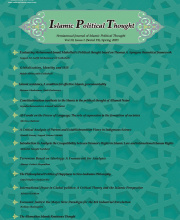۱.
کلید واژه ها:
The Global Resurgence of Religion Multiple Modernizations Post-Westphalia Post-Secularism Theoretical Pluralism
Religion is the biggest absent of International Relations’ science. From the official formation start of this science in the West as a single academic field of studying, religion and religious studies have been forgotten by most of scholars, as far as it can be known that international relations is the most religion separated branch of social modernized sciences. Knowing about the reason of this long time and controversial absence, usually it is citing to five reasons which are the requirements of the modernization’s process in western societies, an inclusive consolidation and acceptance of religion separation principle (secularism), the Westphalia Order of the International System, the domination of the ultra-theory of rationalism on this study field, and the materialistic nature of the mainstream theories in international relations. The current article is trying to study all these reasons, and disproof them, and to claim that deleting the religion from the science of international relations does not have a rational excuse and credibility because of the discredit of the loyalty for modernization single line process, the outbreak of serious doubts about the correctness of religion separation principle and the start of post-secularism, the start of Westphalia order’s deterioration and entering the international system into post-Westphalia era, the sunset of the ultra-theory of rationalism’s domination with the appearance of competitor ultra-theories, and also the formation of various theories and the decrease of the monopoly of the mainstream. Therefore, it is necessary to have a deep understanding of international relations by knowing about the position of religion.
۲.
کلید واژه ها:
Arrogance Anti-arrogance Suppression the Oppressed Imam Khomeini Islamic Republic of Iran
In this paper, it will be tried to explain the Quranic documents about anti-arrogance and support of Oppressed across the world according to Almizan interpretation, employing the text-based interpretation. Then it will be shown that these two principles have been focused and revived by Imam Khomeini. In fact it will be proved that Imam Khomeini has attempted to review the concepts of anti-arrogance and support of Oppressed across the world inspiring by the holy Quran, and has established them as two columns of his internal and foreign policy. Meanwhile it will be tried to study the concepts of anti-arrogance and support of Oppressed, their dimensions, their types, and their components according to Imam Khomeini’s viewpoint to show that the Quranic concept of anti-arrogance and support of Oppressed across the world is among the key components of his thoughts in the direction of realization of the universal government of Islam.
۳.
کلید واژه ها:
Iranophobia Iran Revolution West Hyperreality Representation
Iranophobia is the hyperreality or representation of Iran’s reality in international relations. With the Baudrillard’s postmodern attitude, we can consider this phenomenon as one of the examples of displacement of the boundary of reality and representation, which was put on the agenda of the West, especially the United States, after the victory of the Islamic Revolution of Iran as a political project. Accordingly, Iranophobia was formed influenced by the cultural nature of the Islamic Revolution and its focus on the soft aspects of power and the reflection of the Islamic Revolution in the international relations and possible challenges to the interests of the West, especially in the Middle East region. Thus, in a short period time of after the Revolution, many of the concepts and developments of Iran’s foreign and domestic politics, including the policy of issuing the revolution, Iran’s support for liberation movements and causes, the Iraqi imposed war on Iran, the human rights issue, Iran’s attempt to achieve military-defensive capabilities, etc. were interpreted with a reverse approach to their reality. This article tried to explain the dimensions and forms of Iranophobia and its consequences in the international relations by analyzing the backgrounds and roots of Iranophobia.
۴.
کلید واژه ها:
religion Politics Islamic Government (State) Political Islam The Divine Theory of Government
The relationship between religion and politics is the most important issue that has nowadays engulfed the minds of many theorists of political science. This issue becomes more important when it comes to the phenomenon of Islamic Government (State). In the present world, there are many different interpretations of Islam. Some traditionally believe in the religion’s wide-ranging intervention in politics and some believe in the non-intervention of religion in politics based on the human experience. Theorization on the realm of the presence of religion in politics has entered a new stage. The present research sought to answer the following question: “How religion plays a role in the politics?” Answering the research question, the hypothesis is that the Islamic law, based on the human needs and the epistemological source of revelation, with a maximally reading and interpretation of Islam and in the refuge of the divine theory of the state, has developed a new concept called the “Political Islam”, which is considered the evolved form of the divine theory of government.
